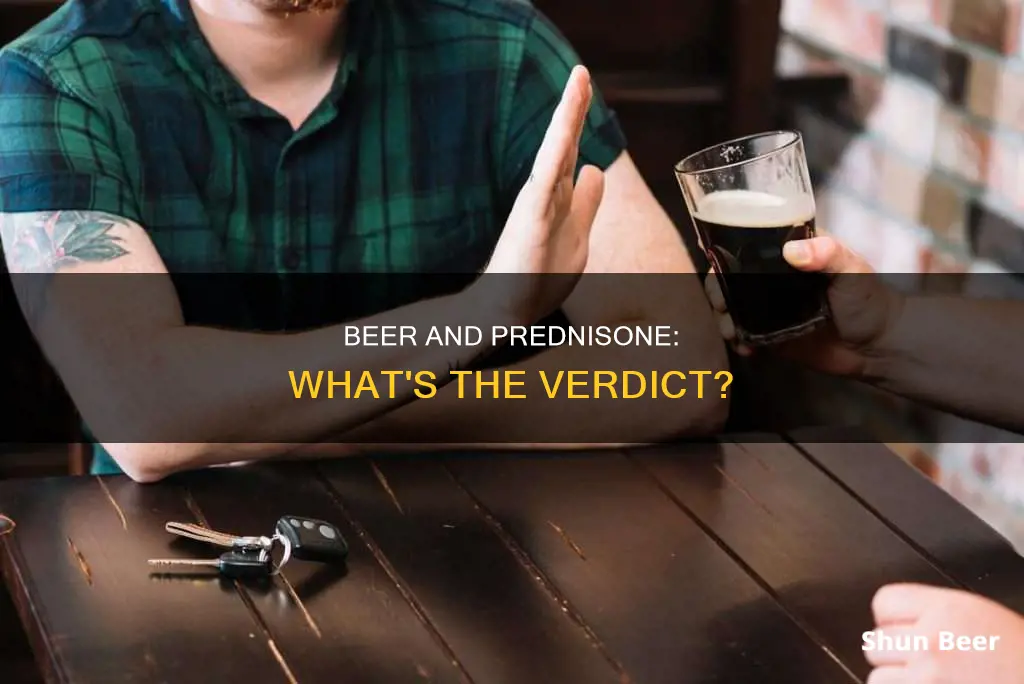
Prednisone is a corticosteroid medication that helps treat conditions like asthma, rheumatoid arthritis, lupus, and multiple sclerosis. It is a strong anti-inflammatory medication that suppresses the immune system, reducing swelling and irritation. While prednisone can be beneficial, it can also have strong side effects such as damage to the stomach and digestive tract. So, can you drink beer while on prednisone?
| Characteristics | Values |
|---|---|
| Can I drink beer while on prednisone? | It is not recommended to drink alcohol while taking prednisone. However, moderate alcohol consumption may be safe, depending on factors such as dosage, duration of treatment, frequency of alcohol consumption, and other medical conditions. |
| Drug interaction | There is no direct drug interaction between prednisone and alcohol. |
| Side effects | Combining prednisone and alcohol can increase the risk of side effects such as weakened immunity, gastrointestinal issues, mental health changes, high blood pressure, weakened bones, electrolyte imbalances, altered blood sugar levels, and weight gain. |
| Risks | Heavy or frequent alcohol consumption can negatively affect treatment outcomes and the body's response to prednisone. It can also increase the risk of infections, digestive problems, and severe health problems such as osteoporosis and a weakened immune system. |
| Recommendations | It is advisable to consult a healthcare professional before consuming alcohol while on prednisone treatment. Abstaining from alcohol until the treatment is completed is generally recommended. |
What You'll Learn

Prednisone and alcohol may both irritate the stomach and digestive tract
While there is no direct interaction between prednisone and alcohol, mixing them is not recommended as they can have similar effects on the body, increasing the risk of side effects.
Prednisone is a corticosteroid, a synthetic version of the corticosteroids produced by the adrenal glands. It is often prescribed to treat inflammatory conditions such as asthma, rheumatoid arthritis, lupus, multiple sclerosis, and Crohn's disease. It is also used to treat severe allergic reactions and certain types of cancer.
Alcohol and prednisone can both irritate the stomach and digestive tract. Consuming excess alcohol can cause inflammation of the stomach lining, leading to heartburn and stomach ulcers. Prednisone can also cause short-term stomach irritation, especially when taken with certain over-the-counter medications like ibuprofen. If you are prone to stomach irritation, it is advisable to avoid consuming alcohol while taking prednisone.
In addition to stomach irritation, other possible side effects of mixing alcohol and prednisone include:
- Increased risk of infections: Both substances suppress the immune system, making it harder for the body to fight off infections.
- Changes in blood sugar levels: Alcohol can lower blood sugar levels, while prednisone can increase them. This can be especially dangerous for people with diabetes.
- Weakened bones: Long-term use of prednisone and excessive alcohol consumption can increase the risk of osteoporosis.
- Weight gain: Both substances can contribute to weight gain, either individually or when combined.
- Electrolyte imbalances: Prednisone can cause changes in electrolytes such as sodium and potassium, while alcohol can also affect electrolyte levels.
The risk of experiencing these side effects depends on several factors, including the dosage and duration of prednisone treatment, the amount of alcohol consumed, and any existing medical conditions. It is always advisable to consult a healthcare professional before consuming alcohol while taking prednisone to discuss potential side effects and interactions. In some cases, abstaining from alcohol during the treatment may be recommended.
Thermal Beer Mugs: How Do They Keep Drinks Cold?
You may want to see also

Prednisone and alcohol can each increase the risk of type 2 diabetes
While there is no direct drug interaction between prednisone and alcohol, mixing the two is not recommended. This is because prednisone and alcohol have similar effects, and taking both at the same time can increase the risk of these side effects occurring.
Prednisone may increase your blood sugar levels beyond the threshold for diabetes, especially in people who are already at risk of developing type 2 diabetes or who have taken steroids for a long time. Alcohol can also increase your blood sugar level, so consuming more than one or two alcoholic drinks per day while taking prednisone further increases your risk of type 2 diabetes.
Other Risks of Mixing Prednisone and Alcohol
In addition to the increased risk of type 2 diabetes, mixing prednisone and alcohol can lead to several other negative effects:
- Immune system suppression: Both prednisone and alcohol suppress the immune system, making it harder for your body to fight off infections.
- Digestive tract issues: Both substances can irritate the digestive tract and cause peptic ulcers.
- Osteoporosis: Long-term use of prednisone and excessive alcohol consumption are both risk factors for osteoporosis due to their impact on bone health.
- Pancreatitis: Prednisone may cause inflammation of the pancreas, and alcohol can worsen this condition.
- Other side effects: Mixing prednisone and alcohol may also lead to dehydration, impaired wound healing, adrenal gland suppression, and changes in blood sugar levels.
Precautions and Recommendations
The risks associated with mixing prednisone and alcohol depend on various factors, including the dosage and duration of prednisone treatment, the amount of alcohol consumed, and any underlying medical conditions. It is always best to consult your doctor before consuming alcohol while taking prednisone. They can advise you based on your specific medical history and conditions. In some cases, abstaining from alcohol during prednisone treatment may be recommended.
Beer Mail: Shipping Alcohol Straight to Your Doorstep
You may want to see also

Prednisone and alcohol can both suppress the immune system
Prednisone is a prescription medication that helps balance your hormones and belongs to the corticosteroid group of medications. It is often prescribed for autoimmune health conditions such as severe allergic reactions, asthma, multiple sclerosis, Crohn's disease, lupus, and rheumatoid arthritis. It is a strong anti-inflammatory medication that suppresses the immune system, reducing swelling and irritation.
Alcohol, on the other hand, is a central nervous system depressant that also suppresses the immune system. When consumed in excess, alcohol can cause inflammation of the stomach lining, leading to heartburn and stomach ulcers. Long-term consumption can also make it easier to contract life-threatening infections such as pneumonia or sepsis.
Both substances have similar effects on the body, and combining them can increase the risk of these side effects occurring. In addition to a weakened immune system, other potential side effects of consuming alcohol with prednisone include gastrointestinal issues, mental health changes, high blood pressure, weakened bones, electrolyte imbalances, altered blood sugar levels, and weight gain.
While occasional light drinking may not lead to severe side effects, heavy or frequent alcohol consumption can seriously affect the treatment outcomes and the body's response to prednisone. It is always best to talk to your doctor first to avoid complications and give you the best outcome. Abstaining from drinking alcohol while on prednisone treatment is always the best option.
Drinking Beer in Dishonored: What's the Deal?
You may want to see also

Prednisone and alcohol may both cause osteoporosis
While there is no direct drug interaction between prednisone and alcohol, mixing them is not recommended. This is because prednisone and alcohol share similar effects and side effects, and taking both at the same time can increase the risk of these side effects occurring.
Prednisone is a corticosteroid used to reduce inflammation or suppress the immune system. It is used to treat many diseases, including asthma, rheumatoid arthritis, lupus, inflammatory bowel diseases, and multiple sclerosis. Corticosteroids are the most common cause of drug-induced osteoporosis.
Osteoporosis is a condition characterised by bone loss and an increased risk of fractures. It is primarily caused by an increased rate of bone breakdown (resorption) and a decreased rate of bone formation. Corticosteroids like prednisone can cause bone loss in two ways. Firstly, they directly increase bone breakdown and decrease bone formation in target tissues. Secondly, they affect calcium and vitamin D metabolism, leading to secondary hyperparathyroidism, which further increases bone breakdown.
Alcohol consumption is also associated with a higher risk of osteoporosis. Drinking higher amounts of alcohol (three drinks or more per day) is linked to an increased risk of osteoporosis and bone fractures. Therefore, both prednisone and alcohol can independently contribute to the development of osteoporosis.
The risk of osteoporosis and bone fractures is further compounded when combining prednisone and alcohol. This combination can enhance the negative effects of each substance on bone health. Additionally, both substances can suppress the immune system, making it more difficult for the body to fight infections.
In conclusion, while prednisone and alcohol may be independently associated with osteoporosis, their concurrent use can potentially exacerbate the risk of developing this condition. It is essential to consult a healthcare professional before consuming alcohol while taking prednisone to assess the potential risks based on individual circumstances.
The Science of Nitro Beers: How Do They Work?
You may want to see also

Alcohol may worsen the side effects of prednisone
The side effects of prednisone include:
- Changes in blood sugar levels
- Damage to the stomach and digestive tract (may result in stomach irritation or a peptic ulcer)
- Dehydration with electrolyte imbalances
- Development of type 2 diabetes
- Immune system suppression
- Impaired wound healing
- Osteoporosis (weakening of the bones)
- Pancreatitis (inflammation of the pancreas)
- Slower wound healing
- Suppression of the adrenal glands
When combined with alcohol, these side effects may be enhanced or made worse. Alcohol can irritate the stomach and digestive tract, causing inflammation of the stomach lining, heartburn, and stomach ulcers. Alcohol can also weaken the immune system, making it harder for the body to fight off infections. Additionally, alcohol is high in calories and can contribute to weight gain, which is already a potential side effect of prednisone.
The combination of prednisone and alcohol can also lead to mental health changes, including mood swings, insomnia, and depression. It can also increase the risk of high blood pressure, as both substances can cause fluid retention.
The risk of experiencing these side effects is higher for people with existing health conditions, those taking prednisone for long-term treatment, and those who consume higher amounts of alcohol. It is important to speak with a healthcare professional before consuming alcohol while on prednisone treatment, as the combination of substances can cause problems. Abstaining from alcohol during treatment is always the best option.
Beer and Teeth Whitening: What You Need to Know
You may want to see also
Frequently asked questions
It is not recommended to drink alcohol while taking prednisone, as it may increase the risk of side effects. However, having one or two drinks per day while on a low dose of prednisone for a short period should be okay.
Both alcohol and prednisone can suppress the immune system, irritate the stomach and digestive tract, increase the risk of infections, cause gastrointestinal issues, and affect blood sugar levels. Additionally, prednisone can weaken bones, and when combined with alcohol, can increase the risk of osteoporosis.
Long-term use of both alcohol and prednisone can have adverse effects on the body. Excessive alcohol consumption is associated with an increased risk of osteoporosis, weight gain, and other health complications. Prednisone, when taken long-term, can also lead to weakened bones, changes in blood sugar levels, and a compromised immune system. Combining the two may exacerbate these issues.
Yes, it is always advisable to consult your doctor before consuming alcohol while on prednisone. The risks and side effects may vary depending on your dosage, duration of treatment, alcohol consumption, and other medical conditions. Your doctor can provide personalized advice based on your medical history.







